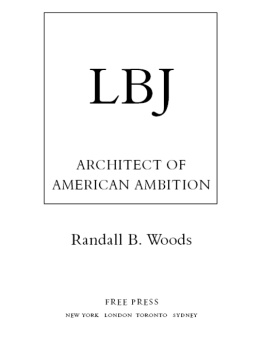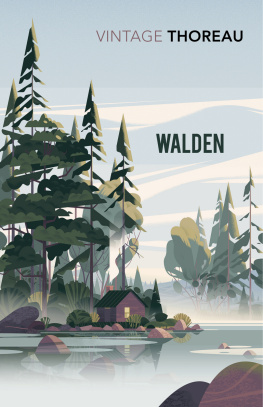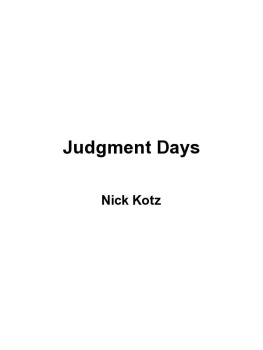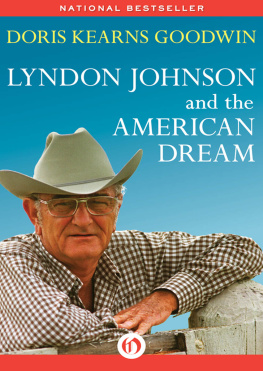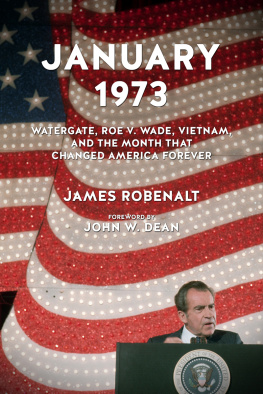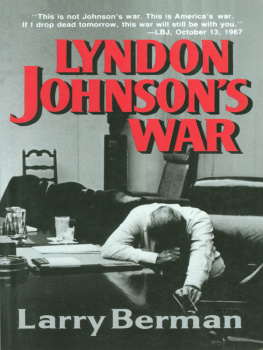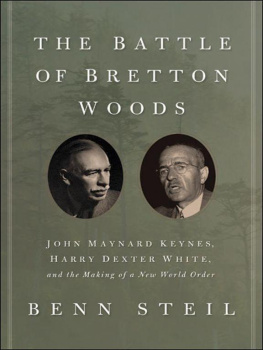

FREE PRESS
A Division of Simon & Schuster, Inc.
1230 Avenue of the Americas
New York, NY 10020
Copyright 2006 by Randall B. Woods
All rights reserved,
including the right of reproduction
in whole or in part in any form.
F REE P RESS and colophon are trademarks of Simon & Schuster, Inc.
Library of Congress Control Number: 2006041259
ISBN-13: 978-1-4165-9331-7
ISBN-10: 1-4165-9331-4
All photos courtesy of LBJ Library, Austin, Texas
Visit us on the World Wide Web:
http://www.SimonSays.com
For Darcy, Cullen, Avery, and Abigail
CONTENTS

In those days John the Baptist appeared in the wilderness of Judea, proclaiming, Repent, for the kingdom of heaven has come near. This is the one of whom the prophet Isaiah spoke when he said, The voice of one crying out in the wilderness: Prepare the way of the Lord, make his paths straight. Now John wore clothing of camels hair with a leather belt around his waist, and his food was locusts and wild honey.
MATTHEW 3:1-12
PROLOGUE

T HE TALL MAN WEARING THE S TETSON SITTING IN the back of an open convertible was as unhappy as he had ever been in his life. Three years earlier, Lyndon Johnson had reluctantly agreed to serve as John F. Kennedys running mate in the 1960 election. The Kennedys had not really wanted him, but the Democrats had to have Texas to win the presidency, and LBJ, the Lone Star States most famous contemporary politician, could carry Texas. Johnson reasoned at the time that his position as majority leader would be meaningless if Richard Nixon and the Republicans won. The thirty-four months he had served as vice president had been excruciating. The Irish Mafia surrounding the president, and the liberal intellectuals that JFK had brought to Washington, snubbed Lyndon and Lady Bird at every opportunity. Portrayed as hayseed, a rube with coarse language and coarser looks, he was the constant butt of jokes on the Georgetown cocktail circuit and at Hickory Hill, Bobby and Ethel Kennedys country home. The president had been outwardly respectful but had shunted LBJ aside to oversee the Space Program and the Committee on Equal Opportunity. As a consolation prize, the Johnsons had been sent on numerous overseas junkets where the vice president invariably responded to the warnings of pretentious U.S. diplomats by deliberately offending local customs. He had grown heavy, looked slovenly, and drank too much, Johnson thought ruefully. He was disgusted with his life and himself. Goddamn the Kennedys and goddamn his political luck!
Beside him in the car were his wife, Lady Bird, and the senior senator from Texas, Ralph Yarborough. Lady Bird was his only spouse but just one of a number of lovers. Throughout their marriage, she had simultaneously supported, reassured, and disappointed him. His volatility craved her stoicism, but at times it infuriated him.
Johnson and Yarborough shared similar values. Yet, LBJ thought, he could not look at the senior senator without a degree of unease. He was a liberal who had won in a state dominated by John Connally, the governor and conservative protg of LBJ. Yarborough and Connally, like the two wings of the Democratic party in Texas, were continually at each others throats, and the Kennedys were constantly after Johnson to clean up the mess. He had hoped that national office would free him from the prejudices and ignorance of the Texas oil and land barons, but it had not. Connally and Yarborough could both go to hell.
But then Johnson roused from his depressing reverie and looked up; it was a beautiful day, crisp and clear with the sun shining brightly out of the huge Texas sky. He noted with relief that the crowds lining the route being taken by the presidential motorcade were large and receptive. Dallas was a notorious hotbed of right-wing fanaticism. Lyndon and Lady Bird had been jostled, cursed, and spat upon by a hostile crowd outside the Adolphus Hotel during the 1960 campaign, a memory burned into their brains. But there were no signs of protesters. Perhaps the day would go well after all. There were already signs that Connally and Yarborough were, for appearances sake, going to paper over their differences, at least for the time being.
With one hand holding his hat in the air and the other waving to the crowd, LBJ felt himself beginning to relax when he heard the crack of a rifle. Time stopped moving; the crowd seemed to hold its collective breath. Then another shot, and another. Rufus Youngblood, the Secret Service agent assigned to the Johnsons, was sitting in the front seat. He reached back with one arm and forced LBJ to the floor. As Lady Bird and Senator Yarborough ducked, Youngblood vaulted over the seat, covering the vice presidents body with his. The Secret Services radio crackled as snippets of information came over the air. By now it was clear to all concerned that they were in the midst of an assassination attempt.
As the motorcade raced off to Parkland Hospital, Johnson, weighed down by Youngbloods two hundred pounds, began to consider his situation. Before their departure for Texas, Washington had been full of rumors that JFK was going to drop him from the ticket. Now there was a possibility that he would become, temporarily at least, president of the United States. The sudden reversal of fortune, if it came, would be stunning. He was both exhilarated and apprehensive. Then his thoughts turned from the personal to the public. Johnson, who could become hysterical over lifes most trivial disruptions but who was given to calm deliberation in a major crisis, began to compose his thoughts. The country, the world, must be reassured, no matter what the origins of the conspiracy against the president or how vast the scope. He let his mind wander briefly to possible perpetrators. The Russians? Unlikely. Since Khrushchevs ascension to power, the Soviet Union had acted more and more like a conventional, status quo power, Marxist rhetoric notwithstanding. Right-wing true believers? Possibly. But most likely it was Castro. Bobby had been trying to kill the Cuban leader ever since the Missile Crisis. Hopefully, the culprit was some deranged American acting alone. God forbid that it turn out to be a Negro and the motive racial. Whoever the shooter was and whatever forces were behind him, the deed was done. He must bind the Union and its people tightly together until the crisis eased.
At Parkland, Lyndon and Lady Bird were hustled into a brightly lit room, the windows covered with sheets. Would-be assassins must be denied a shot at the vice president. The emergency room at the hospital seemed a maze of self-contained compartments, one housing Secret Service personnel, another the Dallas police, and others various medical teams, grieving Kennedy aides, and members of the Johnson entourage. While Lyndon conferred with Youngblood and his colleagues, Lady Bird went to console Jacqueline Kennedy and Nellie Connally, whose husband had also been shot.
Finally, LBJ was informed that Kennedy was dead. Lyndon Johnson was president of the United States. He was tempted to give in to the awe of the moment, but he resisted. Every second was crucial. The way he handled the assassination and its aftermath would do much to determine his success or failure as president, Johnson sensed. It was decided that he and his staff would return on Air Force One rather than Air Force Two because of the formers superior communication equipment. During the ensuing mad dash to Dallas Love Field, LBJ informed Kennedy aide Kenneth ODonnell that he was not leaving without Jackie and the presidents body. They had come together, and they would return together.

